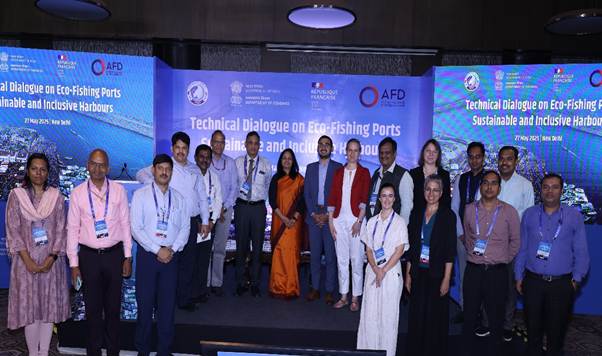Ministry of Fisheries, Animal Husbandry & Dairying
“Eco-Fishing Ports” in Focus: Department of Fisheries and AFD Hold Technical Dialogue in New Delhi
प्रविष्टि तिथि:
27 MAY 2025 5:47PM by PIB Delhi
The Department of Fisheries under the Ministry of Fisheries, Animal Husbandry & Dairying (MoFAH&D) and Agence Française de Développement (AFD) [AFD is an Agency of Development based out of France for technical and financial cooperation] , convened a Technical Dialogue on Eco-Fishing Ports : Sustainable and Inclusive Harbours in New Delhi, today to explore the "eco-fishing ports" concept designed to operate with reduced environmental footprints while maximising economic performance, social inclusion and ecosystem protection. The dialogue focused on promoting best port practices for a healthier environment and safer fish handling, alongside discussions on post-construction evaluation, maintenance and continuous improvement of port infrastructure. The meeting was held under the chairmanship of Ms. Neetu Kumari Prasad, Joint Secretary (Marine), Department of Fisheries. The deliberation was also graced by Ms. Lise Breuil, Country Director, AFD, Ms. Camille Severac, Deputy Country Director, ADF and Mr. Pablo Ahumada, counsellor for International Affairs, French Ambassy. Officials from the state fisheries department, delegates from France, Indonesia, Food and Agriculture Organization (FAO), Asian Development Bank, IIT Madras, Sea food export Association and representatives from Industry also participated in the dialogue.

In her keynote address, Ms. Neetu Kumari Prasad, highlighted India’s vast marine resources and the remarkable achievements of the fisheries sector in production, exports, and livelihood support. Current challenges and bottlenecks such as including inadequate infrastructure and limited market linkages were discussed while also highlighting the approved project proposals for construction/modernization/dredging of 117 FHs and FLCs at a total cost of Rs 9,832.95 crore (USD 1.15 billion) and three smart and integrated fishing harbours under PMMSY at Vanakbara in Daman & Diu, Karaikal in Puducherry and Jakhau in Gujarat. Emphasis was laid on the importance of active stakeholder participation, effective impact assessment mechanisms and the creation of smart, green, and socially responsive ecosystems for the sector’s sustainable growth.
The dialogue featured four thematic technical sessions focused on various aspects of Eco Fishing Ports. Discussions covered the concept, initiatives, and development of Eco Ports, including smart and integrated harbour infrastructure, sustainable design practices, and global strategies such as the FAO’s Blue Port Initiative. Sessions also explored fishing port community dynamics, highlighting stakeholder roles, co-management societies, private harbour models, and approaches to enhance fisheries exports. Environmental sustainability was another key focus, with topics like eco-friendly breakwater designs, hygiene measures, green fishing vessels, and environmental standards. The final theme centered on monitoring, evaluation, and maintenance of Eco Ports, addressing marine pollution, success models, performance indicators, post-construction evaluation, and cost-benefit analysis. Drawing upon AFD's vast international experience in blue economy initiatives, the session facilitated knowledge exchange on sustainable governance models, climate-adaptive strategies, and community participation. The dialogue served as a vital step towards aligning efforts across multiple stakeholders to strengthen the fisheries infrastructure development by fostering collaboration, enhancing capacity-building initiatives, and bridging communication gaps and exchanging cutting edge technologies between stakeholders.
Background
India is endowed with vast and diverse aquatic resources, offering immense potential for sustainable fisheries development. With a coastline of about 11,099 km, the fisheries sector plays a vital role in ensuring food security, generating employment, and fostering entrepreneurship. India ranks second in global fish production, accounting for approximately 8% of the total, and is a global leader in aquaculture and shrimp exports. India exports seafood to more than 132 countries and its export has doubled from Rs 30,213 crore in (FY 2013-14) to Rs 60,523.89 crore (FY 2023-24). The major markets are China, US, EU and Japan as the main export markets. India aims to expand its export basket by adding value added products and seafood species for catering to newer markets.
India’s marine fisheries sector plays a crucial role in sustaining millions of coastal livelihoods, yet it faces growing challenges, including the adverse impacts of climate change. In response, the Department of Fisheries is spearheading efforts to strengthen and modernize fisheries infrastructure through sustainable and inclusive approaches that promote economic growth, ecological conservation, and community well-being. A key focus of these efforts is the enhancement of Fishing Harbours and Fish Landing Centres across the country. These facilities form the backbone of the seafood value chain—facilitating the safe landing, berthing, and servicing of fishing vessels while ensuring efficient post-harvest handling, storage, and transport of fishery products. Beyond logistics, fishing harbours serve as vital hubs that connect fishers to markets, processing units, and consumers, thereby contributing to the socio-economic development of coastal communities.
To further this vision, the Government is implementing the Blue Ports Initiative—a holistic model that integrates sustainable, smart, and green principles into the design and management of fishing harbours. In partnership with the Food and Agriculture Organization (FAO), this initiative supports the development of three model harbours under the Pradhan Mantri Matsya Sampada Yojana (PMMSY). The pilot projects for Smart and Integrated Fishing Harbours incorporate a wide range of innovations and eco-friendly solutions. These include rainwater harvesting systems, energy-efficient lighting, electric-powered equipment, and robust communication and surveillance systems. Advanced technologies such as Internet of Things (IoT) devices, sensor networks, remote sensing, data analytics platforms, and predictive modelling are being deployed for real-time decision-making and harbour operations. Additionally, strong emphasis is placed on environmental sustainability through waste segregation, recycling, composting, installation of sewage treatment plants (STPs), and marine debris clean-up. The integration of renewable energy sources such as solar and wind power along with hybrid energy management systems, further underscores the commitment to building climate-resilient and future-ready fisheries infrastructure.
****
Aditi Agrawal
(रिलीज़ आईडी: 2131683)
आगंतुक पटल : 170